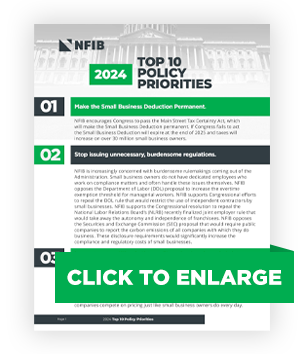NFIB President Brad Close discussed small business issues in the State of the Union
The State of the Union was held on March 7 and covered a wide range of topics, including small business issues. NFIB President Brad Close joined the Small Business Rundown to respond and provide insights on the small business issues mentioned.
“I think from a small business perspective there were some things we had hoped to hear,” said Close. “Specifically on lowering taxes for small businesses, and also reducing the regulatory burden that most small businesses currently face. Those were not brought up in a way we would want to hear them.”
 Earlier this year, NFIB released the top 10 policy priorities for small businesses in 2024, but those priorities were not mentioned in the State of the Union. The number one priority is making the 20% Small Business Deduction permanent, which is set to expire at the end of 2025.
Earlier this year, NFIB released the top 10 policy priorities for small businesses in 2024, but those priorities were not mentioned in the State of the Union. The number one priority is making the 20% Small Business Deduction permanent, which is set to expire at the end of 2025.
“They use this money to create new jobs, to buy equipment, to upgrade their facilities, provide new benefits to employees,” explained Close. “So, losing the ability to put this money back into the business will be very hard and I think we were disappointed that the president did not mention this crucial tax policy for small business and pledge that his administration would make it permanent.”
NFIB has a nationwide Small Business Deduction petition drive to support this effort and show Congress how many small business owners support making the 20% deduction permanent. President Biden did mention other small business-related topics in the speech that Close also responded to in the podcast.
Small business issues in the State of the Union:
-
Job growth and inflation
“Outside of inflation, which is still their number one challenge, job openings are at a record high still,” said Close. “Most small business owners are having a very hard time finding qualified applicants for those job openings. They want to grow, they want to do more, but until they can find workers, they can’t do it and that’s been a recurring problem.”
-
Passing down family farms
NFIB regularly works with family farms and farm owners agree that reduced regulations would help them the most. The Waters of the United States (WOTUS) rule has added strict regulations that directly impact many farms and make their land unusable for farming. The Death Tax is also a significant problem for family farms as the tax bill due at death makes it harder to keep these farms in the family. Urge the U.S. House to support the Death Tax Repeal Act.
-
Pro Act
This is an effort by primarily big labor unions to tip the scale in favor of union organizers, and against small business. It would make it easier for them to unionize a business where workers may not want to join but are pressured, restrict independent contracting, and allow unions to boycott and picket small business owners just for contracting with larger businesses with whom the union has a dispute. Urge your representatives in the U.S. House to oppose this harmful legislation.
“From a small business perspective, it’s a horrible policy and it takes voting protections away from their workers,” explained Close.
-
Minimum wage
Small businesses need more money to come in before they can increase wages and create new jobs.
“When the government decides they want to increase the wage threshold to create a new level of minimum wage, something has to give because most businesses don’t have those resources coming in,” said Close.
Close goes into further detail on these topics and more in the Small Business Rundown episode, “Small Business and the State of the Union.” NFIB urges Congress to support pro-small business policies and not burden small business owners further with burdensome regulations.
“Politicians tend to want to do more and more, but really doing no harm is a good policy for government, especially when it comes to small business owners and a great example of that is regulations,” explained Close. “Adding regulation on regulation for small business owners is very hard. It impedes small business job growth, job creation, creation of new small businesses…There’s no way small businesses can keep up with a crush of regulations. So, one of the best things government can do is just slow down, stop doing more and sometimes doing no harm is the best policy.”
